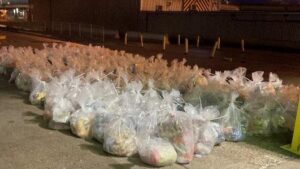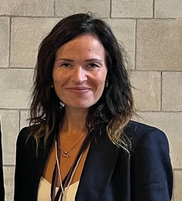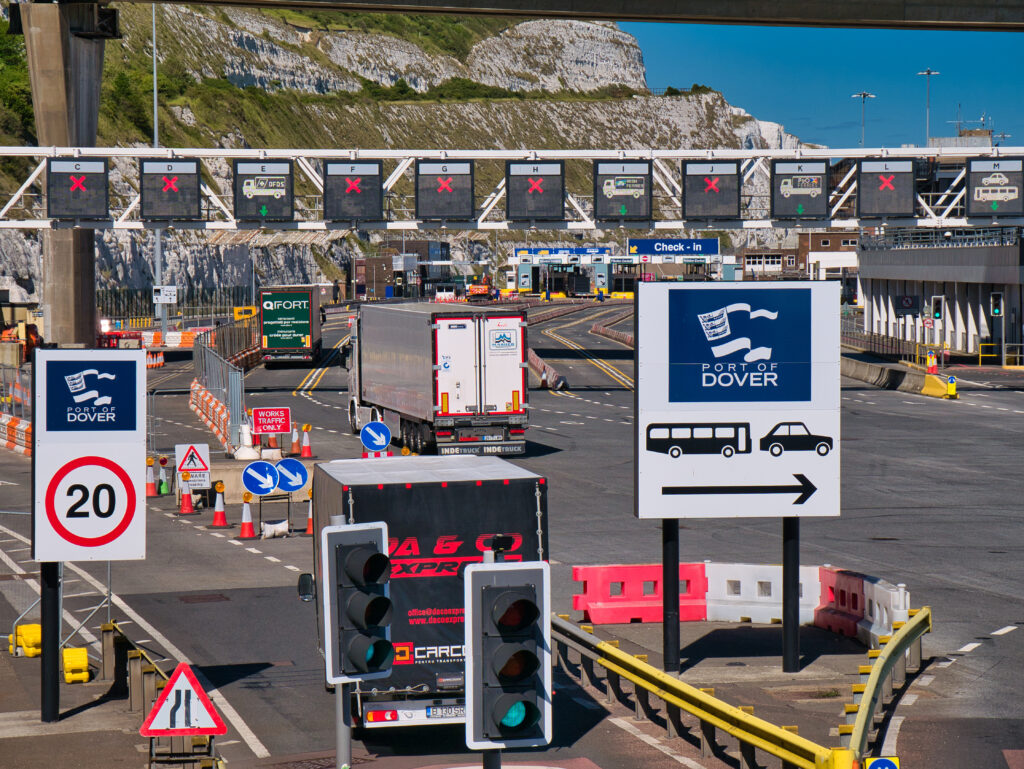Defra has told the Dover Port Health Authority (DPHA) that it will be expected to recover the costs of its work in seizing illegal meat at the port by charging importers, after the Department slashes its budget for the work.
Defra Minister Lord Douglas-Miller has responded to a request from Sir Robert Goodwill, chair of the Environment, Food and Rural Affairs Committee, for clarity over Defra’s funding plans for spot checks of Products of Animal Origin (POAOs) at the port.
Sir Robert wrote to Defra Secretary Steve Barclay a few weeks ago, expressing ‘deep concerns’ over the Department’s plans to slash funding for the DPHA, amid widespread fears this will compromise the work and pose a major biosecurity threat to the UK’s farmers.
Since new rules banning imports of pork products over 2kg not produced to EU commercial standards were introduced in September 2022 as an African swine fever (ASF) control, DPHA and Border Force UK have seized around 70 tonnes of illegally imported meat, the vast majority of it pork from countries affected by ASF. It is widely accepted that this is just the ‘tip of the iceberg’.
Funding cuts
Responding to EFRA’s letter, Lord Douglas-Miller confirmed that Defra is cutting PHA funding used to tackle illegal meat imports, which he said was always going to be temporary until the Government’s Border Target Operation is in place.

While he didn’t discuss the details, a Dover District Council document shows Defra informed it just before Christmas that it was withdrawing 66%, £2m out of £3.2m, of funding from the DPHA in 2024/25, starting in April, and the remaining £1.2m in 2025/26.
The Defra Minister repeatedly stressed that Border Force was ‘responsible for the management of illegal imports’, including spot checks at the point of entry, while PHA officers have been asked to ‘support Border Force to deal with illegal imports of POAO when they are identified’.
“Dover Port Health Authority, along with other PHAs, is currently in receipt of grant funding from Defra, under provisions put in place following the decision by government in 2022 to delay the implementation of SPS controls,” he wrote.
“Once phase two of the BTOM is introduced in April, this transitional grant funding scheme will end as intended: at this point PHAs will be able to charge traders to recover costs.
“Whilst in receipt of this funding, Defra has required Dover PHA to provide support to Border Force to tackle illegal imports, with a sharp focus on identifying illegal meat in accordance with ASF safeguard measures.

“The level of seizures made has shown that these operations, led by Border Force, have been successful and Defra has agreed to put in place new funding to enable this important work to continue.
“Given that the current grant funding was put in place to support BTOM readiness activity, alongside supporting Border Force operations, it is only right that future funding requirements are reviewed to ensure they are proportionate and represent value for money.”
While Defra has advised Dover PHA of the budget cuts, he said Defra had ‘been clear that we are open to a discussion to agree the level of budget required, based on a transparent assessment of resourcing and the associated funding requirement’.
He added: “We have also advised all PHAs that we expect them to introduce charging to recover costs incurred when dealing with illegal imports. We have explained this to Dover and are happy to work with them to consider how best to implement this measure, to supplement core funding.”
He sought to reassure the EFRA committee that ‘biosecurity controls are a priority for Defra’ and that it was ‘not complacent’, adding that the BTOM introduces ‘proportionate controls that will protect the agri-food sector and public health’.
Sevington
While making the ASF spot checks for illegal meat imports will continue at the Port of Dover, Lord Douglas Miller also addressed EFRA’s concerns over the decision to use a site at Sevington, 22 miles inland, rather than at the Port of Dover, for physical checks for imports of POAO from the EU from April 30.
He noted that this was still subject to Sevington receiving approval for designation as a BCP, which it is seeking prior to April 30.
He said a range of factors was considered in making this decision, including the need to safeguard the UK’s biosecurity, the importance of minimising the costs and barriers to trade and the need to ensure value for money for future border operations.
He also insisted Defra has engaged with the local authorities, including Dover, on these decisions, citing various meetings last year – and claimed DPHA had weekly meetings with their point of contact within the Defra borders team until January 17, ‘when they withdrew from engagement’.
Biosecurity threat
Dover District Council said the failure to properly resource the port health function ‘poses a critical and irresponsible biosecurity threat to the UK pork industry and the UK food chain, primarily through exposure to ASF from illicit and uncontrolled insanitary pork imports which are coming into the country through the Port of Dover at 1–2 tonnes per day’.
Responding Defra’s suggestion it could fund this work by charging illegal meat importers, DDC said the Department had been ‘unable to demonstrate how the service could be self-funding’.
 Lucy Manzano, head of port health & public protection at DDC, strongly refuted Defra’s suggestion that it had been working with local authorities to find solutions, and insisted that DPHA was leading on this work.
Lucy Manzano, head of port health & public protection at DDC, strongly refuted Defra’s suggestion that it had been working with local authorities to find solutions, and insisted that DPHA was leading on this work.
Commenting before Defra’s response to the EFRA Committee was published, she said the council had ‘heard absolutely nothing’ from the Department since the proposed cuts were revealed before Christmas, despite various attempts to engage with.
“We have had no contact, whatsoever. It is really frustrating to read in the media that they are working with the port health authority when we have had no contact from them at all,” she told Pig World.
“We are continuing to do everything we can to get Government to engage with us and find solutions because all we want is an outcome that is deliverable and protects everyone. We are the only people doing the ASF controls.”
She said DDC was considering ‘all options available’, including legal action ‘to make sure GB biosecurity is maintained appropriately’. This would involve asking the High Court to rule whether ministers have broken various laws in moving the BCP to Sevington, including fully considering the evidence of the risks of diseases.
Ms Manzano said: “The BTOM has been designed completely on a system of compliance, without any consideration of those who aren’t complying. For the first time, goods will be able to enter and leave the border into GB without any controls at all.”




